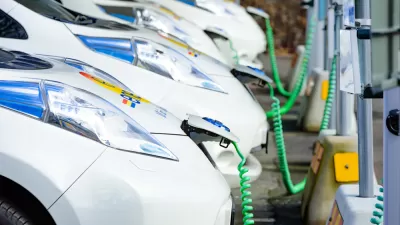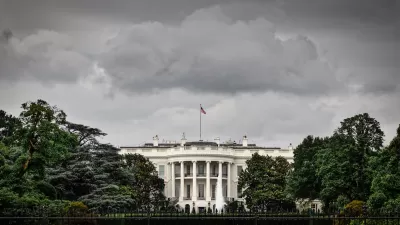A new report points to the 10-15% of vehicles in California that cause half the smog caused by light duty vehicles. Rather than urban strategies such as transit or TOD, the authors support improving the vehicle retirement and replacement program.
The 'No Californian Left Behind' report set forth by the Next Generation 'think tank' concludes low-income residents in rural areas, including Solano County, still drive older, high-polluting cars and can't afford electric vehicles," writes Sarah Rohrs. Furthermore, they "spend a disproportionately high percentage of their income on their vehicles," according to the report made public (Feb. 27).
Consequently, this demographic - low income and largely rural drivers are disproportionate polluters. Next Generation's blog post indicates that "10-15% of California's cars and light trucks emit over half of the smog generated by the state's light duty vehicles," according to the California Air Resources Board (CARB) and the California Burea of Auto Repair.
"That's between 2 million and 3.5 million inefficient models dating mainly from the mid-1990s, which are often unable to pass emissions tests, said report co-author Kate Gordon.
"This large fleet of polluting vehicles form a big barrier in the state's effort to cut down on greenhouse gas (GHG) emissions as required by law, the report notes," writes Rohrs. Yet most GHG reduction strategies are either unaffordable or inappropriate for these drivers.
"We are huge supporters of the electric vehicle program and public transportation programs and all the efforts on high speed rail," said Kate Gordon, Next Generation vice president of climate and energy.
"But the state has missed a huge portion of the population -- those who are car-dependent and non-urban. They should also get access to safe, clean and efficient cars," Gordon said.
"The report has been released as CARB starts to rewrite guidelines for both the state's vehicle retirement and replacement program, and the Enhanced Fleet Modernization Program," adds Rohr.
The state of California has an opportunity to address these problems by helping families replace these cars with cleaner, more fuel-efficient vehicles - and in the process, help a lot of families save a lot of money on gasoline," according to the report.
The full Next Generation report (PDF), “No Californian Left Behind: Clean and Affordable Transportation Options for All through Vehicle Replacement,” can be downloaded here.
FULL STORY: Report: Rural area older cars make most pollution

Alabama: Trump Terminates Settlements for Black Communities Harmed By Raw Sewage
Trump deemed the landmark civil rights agreement “illegal DEI and environmental justice policy.”

Study: Maui’s Plan to Convert Vacation Rentals to Long-Term Housing Could Cause Nearly $1 Billion Economic Loss
The plan would reduce visitor accommodation by 25% resulting in 1,900 jobs lost.

Planetizen Federal Action Tracker
A weekly monitor of how Trump’s orders and actions are impacting planners and planning in America.

Baltimore Ordered to Improve Sidewalk Accessibility
The city is one of many to face lawsuits for failing to comply with the Americans with Disabilities Act.

This Toronto Suburb Has More Bus Riders Than Columbus, Ohio
Brampton, Ontario used gradual improvements in service to prove that if you build it, they will ride.

Paris Bike Boom Leads to Steep Drop in Air Pollution
The French city’s air quality has improved dramatically in the past 20 years, coinciding with a growth in cycling.
Urban Design for Planners 1: Software Tools
This six-course series explores essential urban design concepts using open source software and equips planners with the tools they need to participate fully in the urban design process.
Planning for Universal Design
Learn the tools for implementing Universal Design in planning regulations.
Smith Gee Studio
Alamo Area Metropolitan Planning Organization
City of Santa Clarita
Institute for Housing and Urban Development Studies (IHS)
City of Grandview
Harvard GSD Executive Education
Toledo-Lucas County Plan Commissions
Salt Lake City
NYU Wagner Graduate School of Public Service




























